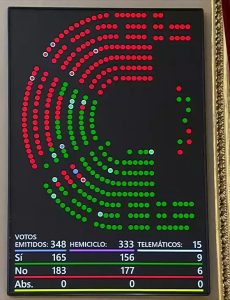With 183 votes against and 165 in favour, and no abstentions, the Congress of Deputies repealed Royal Decree-Law 7/2025, legislation intended to reinforce the Spanish electricity system following the blackout in April.
Among those voting against were the Partido Popular, VOX, Podemos and BNG, exposing a lack of parliamentary consensus even on strategic matters for the country.

During the debate, several parliamentary groups stressed the importance of the decree for addressing structural shortcomings exposed by the 28 April blackout. It included measures to boost self-consumption, increase network flexibility and improve oversight of system operators.
Other voices, however, criticised the decree for consolidating privileges of the electricity oligopoly, weakening environmental oversight, and favouring large corporations without holding them accountable for the blackout. There was also opposition to compensations granted to energy-intensive industries without unlinking them from the power system’s mechanisms.
With the repeal confirmed, the sector is now immersed in a climate of critical regulatory uncertainty, marked by frustration over the loss of structural advances toward a cleaner, more resilient, and efficient system.
The disappointment is palpable in every reaction: not only has a piece of legislation been lost, but also the momentum behind urgent solutions that the sector had broadly supported and considered vital.
For many, it reflects a political moment marred by polarisation, fragile alliances, and governance trapped in a short-term parliamentary chess game.
Sectoral Perspective
Key provisions have been left behind, such as expanding the radius for shared self-consumption, creating the role of a self-consumption manager, declaring energy storage a public utility, and expediting procedures for wind repowering.
The repeal also hinders the push to electrify transport and introduce technical compensation for voltage control from renewables.
In addition, a package of measures aimed at improving the competitiveness of electro-intensive industries is voided. This included targeted incentives, flexible tariffs, and prioritised access to affordable energy via bilateral or renewable contracts.
“This rejection will have very negative consequences. It’s a missed opportunity for job creation and cleaner, more competitive progress towards the energy transition. Investments at risk are around €30 billion,” states UNEF.
In conversation with Strategic Energy Europe, the solar association emphasises that this was a technical text backed by a broad consensus among energy stakeholders, heavy industry, and environmental groups.
“We’ll have to assess the situation, but I don’t see a clear Plan B, and it’s clearly a setback for all the hybridised storage measures included,” notes Chema Zabala, from Alantra Energía.
For his part, Carlos Martín Graña, of ENERJOIN, points out that the inclusion of unrelated measures in a single decree —such as industrial subsidies and anti-blackout provisions— complicated parliamentary support.
He expressed concern about the government’s narrative shift during the debate, warning of a potential new blackout if the decree was not passed, a strategy he sees as escalating political tensions.
Martín Graña believes the repeal is a blow to the competitiveness of Spanish industry, already struggling with electricity prices compared to countries like France and Germany.
Consultant Álvaro de Simón, Head of Partners at Finlight, adds: “We’re falling behind in modernising the electricity grid as per the 2025–2030 plan.” He stresses that a clear regulatory framework and favourable investment conditions are essential to secure demand electrification and attract funding.
Institutional Reactions After the Legislative Setback
Institutional stakeholders also expressed concern. The Spanish Wind Energy Association called the decision a mistake: “It seriously hinders renewable energy development and the electrification of the economy.”
Representing a technology that supplies 23% of the electricity mix, the association is calling for a new legislative framework via a bill or parliamentary proposal.
The Renewables Foundation likewise regretted the repeal, attributing it to “political opportunism” rather than technical grounds. It highlighted that the decree included essential tools like the self-consumption manager, the public utility declaration for storage, and repowering measures especially relevant for regions like Galicia.
Meanwhile, APPA Renovables warned of a potential collapse from maintaining current administrative bottlenecks, stressing that “without a boost to demand or storage, zero and negative price hours will increase, threatening the viability of operating projects.”
The repeal had an immediate impact on the energy ecosystem: key technical tools to respond to the system’s challenges have been left paralysed. Will the government now pursue a new bill to recover the technical core of RDL 7/2025? According to sector voices, the answer appears unavoidable if the system is to regain stability, competitiveness and sustained investment.






























